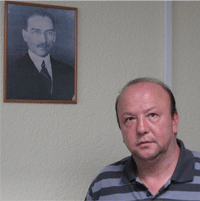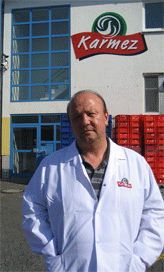The Brothers that Brought D
- Written by Admin TOA
- Published in Euro Turks
Their story resembles that of many immigrant families. Coming from Eskişehir, the family patriarch initially went to Germany to work as a laborer in 1970, and was soon followed by his son Özer and then his wife in 1974.
The Tütüncübaşı siblings first began producing döner upon the request of a vendor near their meat-making firm. On their first day they made 5 kilos worth of döner and that same day the vendor asked three times for more döner. In subsequent days the firm began to sell 80 kilos of döner per day.

The opening in the market did not escape the attention of the Tütüncübaşı siblings and they quickly began to take advantage of the opportunity. Germany's first prepared döner brand Karmez was put on the market. The name “Karmez” comes from the combination of “Kardeşler Mezbahası” (Siblings' Slaughterhouse”) and entered the registry as such. After the untimely death of Müfit Tütüncübaşı, the six brothers and one sister continued their partnership and are currently the leaders of the döner market.
In 1996 Karmez moved to a more modern production facility and from 1998 on started exporting döner to other European countries. In addition to döner production, Karmez also began experimenting with new technologies. They created the first döner slicing machine geared towards meeting the needs of the sector.
In 1996 Karmez was producing seven tons worth of meat while today they are producing 40 tons. Their Frankfurt facility employs 208 workers. More than 500 people also work at firms tied to the Karmez line.
At Karmez Döner each sibling is involved in an area of the business. As for Özer Tütüncübaşı, he serves as the leader of the firm. He underscores the fact, though, that they make decisions cooperatively.
FROZEN DÖNER
Having bought a 40-acre plot and built a facility on it, Karmez is in the process of entering into the new area of frozen döner production. This facility gives them the opportunity to prepare their new product at the site and then package it with a sauce into a small box so that it is ready to cook at home. Rather than only have the choice of eating döner in a restaurant or from a vendor, people can know have the option of making it at home. Tütüncübaşı is ambitious enough to state, “The world is in this box. The effort to introduce the world to Turkish cuisine starts with this box.” The first stage in the construction of a factory to be built with 20-25 million Euro was only finalized this year.
Aside from the leadership status of the Tütüncübaşı siblings in döner production, they have not forgotten the meat industry that they started in. They are still the second largest producers of meat in Frankfurt. In this area the largest facility in Europe is owned by Ege Türk.
Currently Karmez sells döner to more than 4000 customers in the European market. They have active branches in Belgium, Italy, France, Sweden, and Spain.
DÖNER PRICES ARE LOW
Tütüncübaşı has discussed before the nutritional value of döner and it is possible to bear that out upon comparing the calorie amount between ready-made döner and other ready-made food. McDonald’s most famous hamburger, the Big Mac, has a caloric amount of 540, while an order of large fries contains 570 calories. With döner, the caloric count is 350-400 calories. Moreover, the trimmings of tomatoes, onion, and other leafy vegetables put döner ahead of the others in terms of nutritious eating.

According to Tütüncübaşı, the only thing for döner to fear is döner itself. In other words, other producers who perhaps don't have the same careful standards for their production or vendors or restaurants that are being run so competitively as to greatly push down prices. In Germany döner is sold for 2.5-3 Euro. In regions where competition is fierce, such as Berlin, it can be found for 1 Euro in some places. Tütüncübaşı states that döner should actually be sold for 4.5-5 Euro. A McDonald’s Big Mac menu in Germany is sold for about 7 Euro. Ready-made döner's kilo price is sold to the consumer for about 4-7 Euro.
Karmez funded their döner and meat industry activities in Germany with the support of the investment they made in a döner bread factory in Izmir six years ago. This factory, the second largest for flour-based products, puts out two containers of wrap bread daily, and three containers worth of döner bread.
Eight siblings started Karmez and now the second generation has joined their staff. Five of the siblings' offspring now work at the company. Tütüncübaşı states that döner has the ability to sell in whichever market it enters. “It's the number one fast food and a trend that continues to grow. The world is awaiting döner” he says. (October 2007 – Issue 26th)
Latest from Admin TOA
- The Shared Pulse by Eda Uzunkara
- NEO HUMAN 10.0: How Will the Future Be Shaped? (Filiz Dag)
- Calculatit.net Is Bringing Pricing Transparency to America’s Construction Industry
- Support Independent, Trustworthy Journalism
- Fat Sal’s Italian Specialties Welcomes Customers in Bayville, NJ with a Renewed Concept








